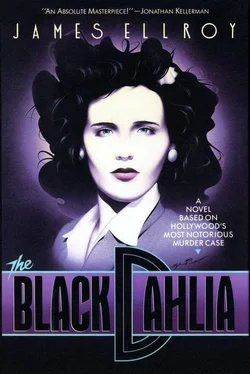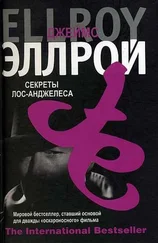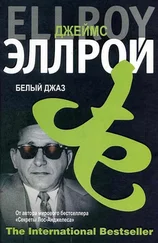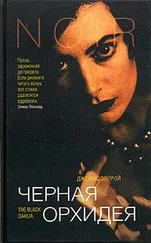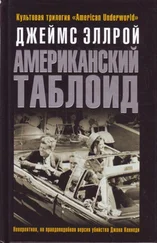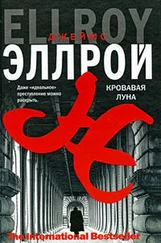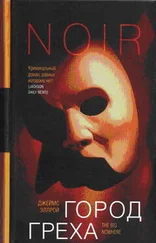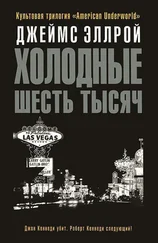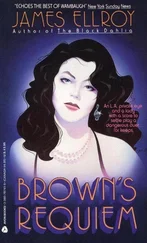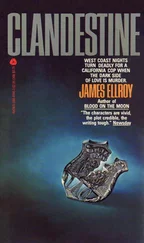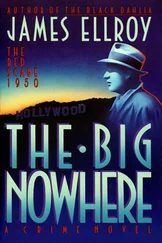“What?”
“Look for the woman. Even with a snootful of juice, old Tomas can’t let Inez go. I’ll lay you ten to one that when he hits the gas chamber she’ll be right there with him.”
“Maybe he’ll cop a plea. Fifteen to life, out in twenty.”
“No. He’s a dead man. Cherchez la femme, Bucky. Remember that.”
I walked through the house looking for a place to sleep, finally settling on a downstairs bedroom with a lumpy bed way too short for my legs. Lying down, I listened to sirens and gunshots in the distance. Gradually I dozed off, and dreamed of my own few and far between women.
By the morning the riot had cooled off, leaving the sky hung with soot and the streets littered with broken liquor bottles and discarded two-by-fours and baseball bats. Blanchard called Hollenbeck Station for a black-and-white to transport his ninth hard felon of 1943 to the Hall of Justice jail, and Tomas Dos Santos wept when the patrolmen took him away from us. Blanchard and I shook hands on the sidewalk and walked separate routes downtown, him to the DA’s office to write up his report on the capture of the purse snatcher, me to Central Station and another tour of duty.
The LA City Council outlawed the wearing of the zoot suit, and Blanchard and I went back to polite conversation at roll call. And everything he stated with such rankling certainty that night in the empty house came true.
Blanchard was promoted to Sergeant and transferred to Highland Park Vice early in August, and Tomas Dos Santos went to the gas chamber a week later. Three years passed, and I continued to work a radio car beat in Central Division. Then one morning I looked at the transfer and promotion board and saw at the top of the list: Blanchard, Leland C, Sergeant; Highland Park Vice to Central Warrants, effective 9/15/46.
And, of course, we became partners. Looking back, I know that the man possessed no gift of prophecy; he simply worked to assure his own future, while I skated uncertainly toward mine. It was his flat-voiced “Cherchez la femme” that still haunts me. Because our partnership was nothing but a bungling road to the Dahlia. And in the end, she was to own the two of us completely.
The road to the partnership began without my knowing it, and it was a revival of the Blanchard-Bleichert fight brouhaha that brought me the word.
I was coming off a long tour of duty spent in a speed trap on Bunker Hill, preying on traffic violators. My ticket book was full and my brain was numb from eight hours of following my eyes across the intersection of 2nd and Beaudry. Walking through the Central muster room and a crowd of blues waiting to hear the P.M. crime sheet, I almost missed Johnny Vogel’s, “They ain’t fought in years, and Horrall outlawed smokers, so I don’t think that’s it. My dad’s thick with the Jewboy, and he says he’d try for Joe Louis if he was white.”
Then Tom Joslin elbowed me. “They’re talking about you, Bleichert.”
I looked over at Vogel, standing a few yards away, talking to another cop. “Hit me, Tommy.”
Joslin smiled. “You know Lee Blanchard?”
“The Pope know Jesus?”
“Ha! He’s working Central Warrants.”
“Tell me something I don’t know.”
“How’s this? Blanchard’s partner’s topping out his twenty. Nobody thought he’d pull the pin, but he’s gonna. The Warrants boss is this felony court DA, Ellis Loew. He got Blanchard his appointment, now he’s looking for a bright boy to take over the partner’s spot. Word is he creams for fighters and wants you. Vogel’s old man’s in the Detective Bureau. He’s simpatico with Loew and pushing for his kid to get the job. Frankly, I don’t think either of you got the qualifications. Me, on the other hand...”
I tingled, but still managed to come up with a crack to show Joslin I didn’t care. “Your teeth are too small. No good for biting in the clinches. Lots of clinches working Warrants.”
But I did care.
That night I sat on the steps outside my apartment and looked at the garage that held my heavy bag and speed bag, my scrapbook of press clippings, fight programs and publicity stills. I thought about being good but not really good, about keeping my weight down when I could have put on an extra ten pounds and fought heavyweight, about fighting tortilla-stuffed Mexican middleweights at the Eagle Rock Legion Hall where my old man went to his Bund meetings. Light heavyweight was a no-man’s-land division, and early on I pegged it as being tailor-made for me. I could dance on my toes all night at 175 pounds, I could hook accurately to the body from way outside and only a bulldozer could work in off my left jab.
But there were no light heavyweight bulldozers, because any hungry fighter pushing 175 slopped up spuds until he made heavyweight, even if he sacrificed half his speed and most of his punch. Light heavyweight was safe. Light heavyweight was guaranteed fifty-dollar purses without getting hurt. Light heavyweight was plugs in the Times from Braven Dyer, adulation from the old man and his Jew-baiting cronies and being a big cheese as long as I didn’t leave Glassell Park and Lincoln Heights. It was going as far as I could as a natural — without having to test my guts.
Then Ronnie Cordero came along.
He was a Mex middleweight out of El Monte, fast, with knockout power in both hands and a crablike defense, guard high, elbows pressed to his sides to deflect body blows. Only nineteen, he had huge bones for his weight, with the growth potential to jump him up two divisions to heavyweight and the big money. He racked up a string of fourteen straight early-round KOs at the Olympic, blitzing all the top LA middles. Still growing and anxious to jack up the quality of his opponents, Cordero issued me a challenge through the Herald sports page.
I knew that he would eat me alive. I knew that losing to a taco bender would ruin my local celebrity. I knew that running from the fight would hurt me, but fighting it would kill me. I started looking for a place to run to. The army, navy and marines looked good, then Pearl Harbor got bombed and made them look great. Then the old man had a stroke, lost his job and pension and started sucking baby food through a straw. I got a hardship deferment and joined the Los Angeles Police Department.
I saw where my thoughts were going. FBI goons were asking me if I considered myself a German or an American, and would I be willing to prove my patriotism by helping them out. I fought what was next by concentrating on my landlady’s cat stalking a bluejay across the garage roof. When he pounced, I admitted to myself how bad I wanted Johnny Vogel’s rumor to be true.
Warrants was local celebrity as a cop. Warrants was plainclothes without a coat and tie, romance and a mileage per diem on your civilian car. Warrants was going after the real bad guys and not rousting winos and wienie waggers in front of the Midnight Mission. Warrants was working in the DA’s office with one foot in the Detective Bureau, and late dinners with Mayor Bowron when he was waxing effusive and wanted to hear war stories.
Thinking about it started to hurt. I went down to the garage and hit the speed bag until my arms cramped.
Over the next few weeks I worked a radio car beat near the northern border of the division. I was breaking in a fat-mouthed rookie named Sidwell, a kid just off a three-year MP stint in the Canal Zone. He hung on my every word with the slavish tenacity of a lapdog, and was so enamored of civilian police work that he took to sticking around the station after our end of tour, bullshitting with the jailers, snapping towels at the wanted posters in the locker room, generally creating a nuisance until someone told him to go home.
Читать дальше
